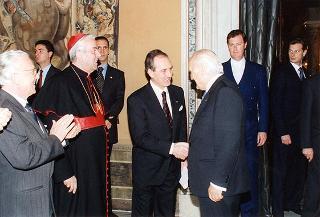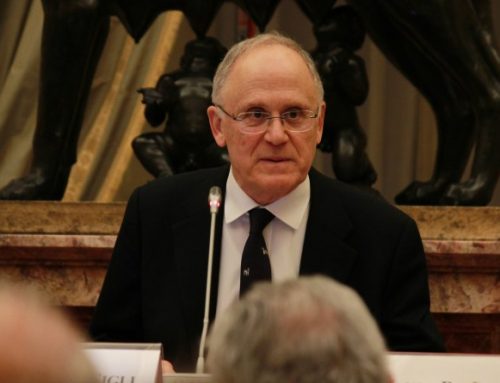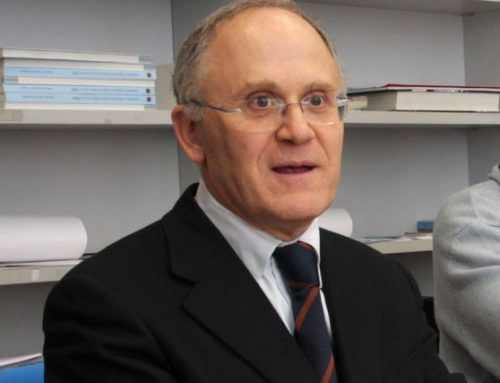(Foto: Presidenza della Repubblica Italiana. Presidente, Oscar Luigi Scalfaro. Prof. Di Virgilio con una delegazione 20º Congresso nazionale AMCI per il 50º Anniversario dell´ Associazione. Cardinale, Fiorenzo Angelini)
Domenico Di Virgilio (Nino to his friends) was born in Montefino (in the Region of Abruzzi) on the 23rd of June,1939.

I met him for the first time in 1976, a few months after my graduation in Medicine, at the National Congress of the Italian Association of Catholic Doctors (AMCI) in Castellammare di Stabia, near Naples.
I think it was on that very same occasion that he became the secretary general of AMCI. Throughout the years to follow (it would be better to say for my entire professional life) our roads ran close, sometimes parallel.
Both of us came from humble families of simple but strong faith and originated from poor regions around Rome. However, our age difference, although only 13 years, was sufficient to present us with quite different scenarios. Nino graduated when the presence of Catholic organisations, including that of doctors, was strong and capable of exerting a great influence on the ethics and the cultural values of society in general, and of our profession in particular. I entered medical school after the costume transformations which followed in 1968 and during the so called “lead years”, those of terrorism, when Catholics were under attack.
When I was still specialising, he was already the chief of a unit of internal medicine in a new religious hospital in Rome. Nevertheless, we had the opportunity of fighting the good battle together against legal abortion in Italy and to contributed to moving the cultural resistance among doctors after the defeat in the referendum. With different roles and responsibilities, I became one of his closest collaborators in the Association, before when he was the secretary general, and after 1988 when he became the national President, succeeding Prof. Pietro De Franciscis. He was a very capable President, full of energy, capable of relationships, always present at events, enjoying the support of, the contacts and the participation in the initiatives promoted by the future Cardinal Angelini, the Ecclesiastical Assistant of AMCI.
We visited many local associations in Italy together and organised the national congresses. Alongside Nino, I started to take part in the meetings of the Executive Committee of FIAMC and FEAMC. Together we supported Cardinal Angelini in the organisation of the Medical Ethics Symposia, which gathered physicians, clergy, politicians, and scientists, including several Nobel Prize laureates.
In his apartment I had the opportunity of meeting the Servant of God Prof. Jérôme Lejeune for the first time, when he was “ostracized” by his own country.
Together, after 1978, we enjoyed the great impulse coming from Saint John Paul II, who was close to the Catholic Associations of Lays and profoundly linked to the doctors and to sick people, especially after the attack of Ali Agca in 1981.
The turning point was in 1982, when we organised the XV FIAMC Congress in Rome, with participants coming from all continents, including poorer countries, also thanks to the financial support found by Cardinal Angelini. John Paul II moved from the Vatican to visit the participants, in an overcrowded hall which was filled with almost 3000 enthusiastic people. Following the explicit request from final resolutions of that Congress, two gifts came from the Pope: the Apostolic Letter “Salvifici Doloris” (1984), the first document of the Teaching of the Church entirely dedicated to the theological meaning of human suffering, and the Motu Proprio “Dolentium Hominum”, giving birth to the Pontifical Council for the pastoral care of the health world in 1985.
With Angelini in the Roman Curia, the activities of Nino Di Virgilio received another tremendous boost.
Those years had some momentous events, like the canonizations of Prof. Giuseppe Moscati (1987) and Dr. Riccardo Pampuri (1989), and the beatification of Dr. Gianna Beretta Molla in 1994 (she was be proclaimed a Saint in 2004).
In 1992, the Saint Pope, who was already affected by Parkinson’s disease by then, decided to celebrate the yearly International Day of the Sick, which became an occasion to promote contacts within the health pastoral care in the hosting countries.
In 1994 with the Motu Proprio “Vitae Mysterium”, John Paul II established the Pontifical Academy for Life, which Cardinal Angelini asked to be presided over by a lay person, identified by John Paul II as Jérôme Lejeune. In 1995 there was the publication of the paramount Encyclical Letter “Evangelium Vitae”. Di Virgilio was in the middle of all these events, and I accompanied him, becoming undersecretary general and then Secretary general of AMCI in 1992.
In 2001, Nino was elected to join the Italian Parliament, being reelected in the XV and XVI legislatures, to end his mandate only in February 2013.
During this period, he remained at the head of the Italian Association, while always trying to promote human health and respect of life in his parliamentary activity.
In 1998, I was elected President of FIAMC and in the Holy Year 2000 FIAMC and AMCI jointly organised the Jubilee of doctors in St. Peter’s, with 7000 physicians gathering around John Paul II.
In 2004, jointly with the Pontifical Academy for Life, FIAMC organised a memorable meeting on “Life Sustaining Treatments and the Vegetative State” in Rome, which received an important speech of Pope John Paul II, later confirmed by the Congregation for the Doctrine of the Faith, when the Pontiff had become Benedict XVI. In the same year he stepped down from the presidency of AMCI.
In 2005-2006, Di Virgilio for one year became undersecretary of state at the Italian Ministry of Health. Following the pressure rising to withdraw hydration and nutrition to people in vegetative state and the precise message given by John Paul II, he asked me to coordinate an ad hoc committee at the Ministry of Health, which issued the document upon which Italy organized the health care for people with prolonged disorders of consciousness. This activity also contributed to delaying euthanasic laws in Italy.
Whilst he was a member of Parliament and serving in the Italian Government, he promoted equality in the access to health care, independently of the severity of brain damage, of the disease rarity, of citizenship and of age. His most important contributions were to the law for developing the Italian network of palliative care and that, unfortunately unsuccessful, aimed to introducing a living will without euthanasic characteristics.
After working his entire life for physicians and for the dignity of sick people, Nino Di Virgilio sadly became sick himself, affected by a chronic progressive disease which, little by little, reduced his mobility, confining this energetic and super active man in the space of his room and in need for continuous assistance.
In March 2013, Nino was already sick when I became a member of the Italian Parliament, where I tried to continue his witness.
He fought his battle with strength and courage, always supported incessantly by the love of his wife Paola and his son Roberto right until his end.
Except for the years in which he was impeded by the disease, he continued to exercise his medical profession, beloved by his patients also for his clinical competence, openness and frankness. Although not being a scientist, he was always attentive to the development of medical science, especially in the field of liver diseases, which he was especially interested in.
He passed away on Tuesday the 28th of September, at the age of 82.
After his long suffering, may he contemplate the Holy Face of the Man of the Passion, whose devotion we shared.
Arrivederci Nino. Riposa in Pace.
Gian Luigi Gigli
Past President FIAMC





